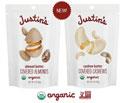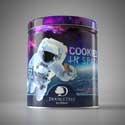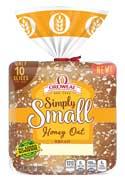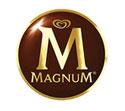Highlights
ProAmpac Develops FDA-Compliant Flexible Pouch With 25% Post-Consumer Recycled Content
 ProAmpac collaborated with purveyor of flavored nut butters, Justin’s, to develop a plastic pouch made of 25% post-consumer recycled (PCR) that is FDA-compliant. PCR is used for 40% of the sealant film, which equates to 25% of the total packet. The pouch will be used for a new line of almond butter covered almonds and cashew butter covered cashews. The packaging ensures product freshness with high oxygen- and moisture-barrier properties. ProAmpac overcame hazy printing common with use of high PCR by combining flexographic inks and coating technologies, and changing the lamination processes.[Image Credit: © Business Wire, Inc.]
ProAmpac collaborated with purveyor of flavored nut butters, Justin’s, to develop a plastic pouch made of 25% post-consumer recycled (PCR) that is FDA-compliant. PCR is used for 40% of the sealant film, which equates to 25% of the total packet. The pouch will be used for a new line of almond butter covered almonds and cashew butter covered cashews. The packaging ensures product freshness with high oxygen- and moisture-barrier properties. ProAmpac overcame hazy printing common with use of high PCR by combining flexographic inks and coating technologies, and changing the lamination processes.[Image Credit: © Business Wire, Inc.]
Hilton Hotel Chain To Send Its Cookie Dough Into Outer Space

U.S. hotel chain DoubleTree by Hilton has partnered with space flight appliance company Zero G Kitchen and NanoRacks, which provides commercial access to space travel, to launch a batch of its DoubleTree Cookie dough and a prototype oven to the International Space Station (ISS) as part of a microgravity experiment. With the launch, Hilton becomes the first hospitality company to participate in research aboard the space station. The husband and wife team at Zero G Kitchen responsible for the space oven concept said the DoubleTree Cookie was their first thought when they began creating an oven to make space travel more comfortable.[Image Credit: © DoubleTree by Hilton/The Christie Cookie Company]
Bimbo Bakeries Says Downsized Households Deserve A Downsized Loaf Of Bread

The Arnold, Brownberry and Oroweat bread brands of Bimbo Bakeries USA have single-person household in minds with their new Simply Small 10-slice bags. The idea is to provide just the right ammoungt of bread needed by smaller households while avoiding food waste. The single-person household is no small demographic: twenty-eight percent of U.S. households fit the category. And they often skip buying bread because they just don’t eat a regular loaf. Simply Small is available in Honey Oat and White with Whole Milk varieties under all three labels. They have no artificial preservatives, colors or flavors, no high fructose corn syrup, and no trans fat. Simply Small breads are available at major retailers on the East and West Coasts at about $2.49 a package.[Image Credit: © Bimbo Bakeries USA, Inc.]
Better Ingredients, Better Pizza – For Breakfast?
 A recent survey of 9,000 customers commissioned by mobile pizza-ordering and delivery service Slice found that 53 percent preferred cold pizza for breakfast than cereal or eggs. Though it’s a finding that many nutritionists and cereal makers may find indigestible – some consider pizza at any time of the day a no-no – others argue that pizza has more nutrients than cereal or doughnuts. For example, a New York-based nutritionist says a slice of pizza contains more fat and much less sugar than most cold cereals, “so you will not experience a quick sugar crash.” Pizza also has more protein than a bowl of cereal. If the idea of pizza-for-breakfast catches on, “some pizza purveyors may want to think about opening earlier in the day to take advantage of the demand for pizza in the morning.” [Image Credit: © Lutz Peter from Pixabay]
A recent survey of 9,000 customers commissioned by mobile pizza-ordering and delivery service Slice found that 53 percent preferred cold pizza for breakfast than cereal or eggs. Though it’s a finding that many nutritionists and cereal makers may find indigestible – some consider pizza at any time of the day a no-no – others argue that pizza has more nutrients than cereal or doughnuts. For example, a New York-based nutritionist says a slice of pizza contains more fat and much less sugar than most cold cereals, “so you will not experience a quick sugar crash.” Pizza also has more protein than a bowl of cereal. If the idea of pizza-for-breakfast catches on, “some pizza purveyors may want to think about opening earlier in the day to take advantage of the demand for pizza in the morning.” [Image Credit: © Lutz Peter from Pixabay]
Dominique Ansel Of Cronut Fame Honors N.Y. With Whimsical Treats
 N.Y.-based French pastry chef Dominique Ansel, creator of the hugely popular cronut six years ago, is celebrating his fifteenth anniversary by honoring the Big Apple with his “New York Collection.” The whimsical assortment comprises nine sweet treats molded to look like classic symbols of the city. Among the creations are a "bagel and cream cheese" graham-cracker meringue, a tiramisu in the shape of a bodega coffee cup, a fluffy street-cart pretzel, a pizza slice, a hot dog with a mustard squiggle, and more. Available until Labor Day, Ansel’s creations were created using a 3-D printer to make the molds. Prices range from $7.25 to $9, only at Dominique Ansel Bakery on Spring St. in Manhattan.[Image Credit: © Thomas Schauer >> studio for photography LLC and Dominique Ansel]
N.Y.-based French pastry chef Dominique Ansel, creator of the hugely popular cronut six years ago, is celebrating his fifteenth anniversary by honoring the Big Apple with his “New York Collection.” The whimsical assortment comprises nine sweet treats molded to look like classic symbols of the city. Among the creations are a "bagel and cream cheese" graham-cracker meringue, a tiramisu in the shape of a bodega coffee cup, a fluffy street-cart pretzel, a pizza slice, a hot dog with a mustard squiggle, and more. Available until Labor Day, Ansel’s creations were created using a 3-D printer to make the molds. Prices range from $7.25 to $9, only at Dominique Ansel Bakery on Spring St. in Manhattan.[Image Credit: © Thomas Schauer >> studio for photography LLC and Dominique Ansel]
Japanese Rice Vermicelli Maker Hopes To Ride Gluten-Free Wave In U.S.
 Japanese rice vermicelli maker Kenmin (Kobe) has spent a year modifying its product to comply with U.S. import regulations and is now ready to launch here. The decision to export to the U.S. was based on the continuing popularity of the gluten-free diet craze. The company’s rice vermicelli is produced by steaming and drying mashed rice, and seasoning with pork and chicken extract. The U.S. imposes import restrictions on food containing meat extract, so the firm has not been able to sell the same product there as in Japan. The company plans to sell its Yaki Be-fun brand at supermarkets for about $2 a bag, and aims to sell a million packages in fiscal 2020.[Image Credit: © Picdream from Pixabay]
Japanese rice vermicelli maker Kenmin (Kobe) has spent a year modifying its product to comply with U.S. import regulations and is now ready to launch here. The decision to export to the U.S. was based on the continuing popularity of the gluten-free diet craze. The company’s rice vermicelli is produced by steaming and drying mashed rice, and seasoning with pork and chicken extract. The U.S. imposes import restrictions on food containing meat extract, so the firm has not been able to sell the same product there as in Japan. The company plans to sell its Yaki Be-fun brand at supermarkets for about $2 a bag, and aims to sell a million packages in fiscal 2020.[Image Credit: © Picdream from Pixabay]
Clean-Label Vegan Bakery Rubicon Lands In Target Stores In Northern Calif.
Grain, Baking Groups Urge Maintaining Carb Intake Levels
 Representatives of the American Bakers Association (ABA) told a U.S. dietary guidelines advisory panel recently that carbohydrate intakes should remain at the 2015 recommended level of between 45-65 percent of daily calories. Registered dietician Kathy Wiemer also recommended six servings daily of traditional grains with at least half as whole grains, “given that Americans continue to under-consume whole grains.” She also urged American to eat at least three servings of enriched grains. The recommendations in the advisory committee's scientific report, due next year, will form the basis of the 2020-2025 Dietary Guidelines for Americans (DGAs). Other organizations testifying before the panel as part of an umbrella group known as the Grain Chain included the Wheat Foods Council, the Independent Bakers Association, the Grain Foods Foundation, the Grain Chain, the North American Millers' Association, the Wheat Foods Council, the USA Rice Federation, and the Retail Bakers of America.[Image Credit: © ABA ]
Representatives of the American Bakers Association (ABA) told a U.S. dietary guidelines advisory panel recently that carbohydrate intakes should remain at the 2015 recommended level of between 45-65 percent of daily calories. Registered dietician Kathy Wiemer also recommended six servings daily of traditional grains with at least half as whole grains, “given that Americans continue to under-consume whole grains.” She also urged American to eat at least three servings of enriched grains. The recommendations in the advisory committee's scientific report, due next year, will form the basis of the 2020-2025 Dietary Guidelines for Americans (DGAs). Other organizations testifying before the panel as part of an umbrella group known as the Grain Chain included the Wheat Foods Council, the Independent Bakers Association, the Grain Foods Foundation, the Grain Chain, the North American Millers' Association, the Wheat Foods Council, the USA Rice Federation, and the Retail Bakers of America.[Image Credit: © ABA ]
UK Government Teams Up With Businesses To Seek Alternative Plastic Options

As part of the UK's Clean Growth Challenge, a joint initiative between the UK government and private business aims to invest some GBP200 million in research into alternative packaging options to help cut single-use plastic packaging. The government’s contribution is GBP60 million. The expectation is that plant-based options will replace oil-based plastics. Companies signed up to the effort include Unilever and Sainsbury’s. [Image Credit: © vedat zorluer from Pixabay]
Sainsbury’s To Remove Hard-To-Recycle Black Plastic Trays From The Chiller Cabinets
 The UK supermarket chain Sainsbury’s said it will be first among retailers to eliminate the black plastic trays often used for chilled ready meals, in favour of a recyclable tray made from natural CPET. Sainsbury’s says the move, to be completed by November 2019, will reduce the volume of hard-to-recycle plastic by over 1,000 metric tonnes a year. Earlier in the same week, the company announced a trial to take away the single use plastic bags for loose fruit and vegetable, and replace them with reusable drawstring bags.[Image Credit: © J Sainsbury plc]
The UK supermarket chain Sainsbury’s said it will be first among retailers to eliminate the black plastic trays often used for chilled ready meals, in favour of a recyclable tray made from natural CPET. Sainsbury’s says the move, to be completed by November 2019, will reduce the volume of hard-to-recycle plastic by over 1,000 metric tonnes a year. Earlier in the same week, the company announced a trial to take away the single use plastic bags for loose fruit and vegetable, and replace them with reusable drawstring bags.[Image Credit: © J Sainsbury plc]
Survey Shows UK Consumers Have Poor Understanding Of Film Recycling
Unilever’s Magnum Ice Cream Launches Some Plastic Jars Made With Recycled Plastic
 Magnum said it would be the first ice cream brand to use recycled polypropylene plastic for its packaging. In a limited trial it will launch 600,000 new Magnum jars in Belgium, Spain and the Netherlands, then release over 3 million in 2020 as it goes worldwide. Recycled polypropylene (rPP) has been used before for beauty and hygiene care applications but not for food packaging. To develop a solution, Unilever has worked with chemicals company SABIC since early 2018. Unilever did not indicate the percentage of plastic that is recycled, but acknowledged it uses a ‘mass balancing’ approach. It proclaimed the effort as part of its plan to ensure that by 2025 25% of plastic used in its packaging is recycled.
Magnum said it would be the first ice cream brand to use recycled polypropylene plastic for its packaging. In a limited trial it will launch 600,000 new Magnum jars in Belgium, Spain and the Netherlands, then release over 3 million in 2020 as it goes worldwide. Recycled polypropylene (rPP) has been used before for beauty and hygiene care applications but not for food packaging. To develop a solution, Unilever has worked with chemicals company SABIC since early 2018. Unilever did not indicate the percentage of plastic that is recycled, but acknowledged it uses a ‘mass balancing’ approach. It proclaimed the effort as part of its plan to ensure that by 2025 25% of plastic used in its packaging is recycled.[Image Credit: © Unilever]
Lidl Introduces Reusable Bags For Fruit And Vegetables

To help prevent use of flimsy disposable plastic bags used to hold fruit and vegetables, Lidl has introduced reusable bags that cost 69p (~$1) for two. It claims to be the first supermarket in the UK to introduce such bags. The effort is part of Lidl’s plan to reduce plastic packaging by 20% by 2022. The move follows similar action by other retailers such as Morrisons and Sainsbury’s that have removed plastic bags for loose fruit and vegetables, encouraging consumers to use their own bags.[Image Credit: © Lidl Great Britain Limited]
Family Bakery In Upper Wisconsin Focuses On Healthful Breads Made From Ancient Grains

A Michigan couple who started baking bread together for fun and relaxation eventually abandoned their careers and moved away from Detroit, eventually launching a bakery in Egg Harbor, Wis., north of Green Bay on Lake Michigan. Over the years Michael and Jenny MacReady’s bakery has expanded, hiring mostly retirees, but at its core has remained a family business that stresses healthful baked goods. Bread baker Michael makes whole grain breads, turning out loaves made from locally grown emmer (farro), spelt and einkorn, and rye flour. The MacReady Artisan Bread Company is now famous for its bread, which is wholesaled to local restaurants, but also for their sandwiches, soups, pastries, and pies. [Image Credit: © MacReady Artisan Bread Company]
Coca-Cola Ireland Moves To 50 Percent Recycled Plastic Packaging
 Coca-Cola Ireland announced that all of its 500 ml and smaller packs are now being made from 50 percent recycled plastic (rPET). “Take-home" packs, which include all bottles larger than 500ml, have moved to 25 percent rPET. The recycled material will be incorporated across Coca-Cola's full portfolio, which includes Coca-Cola, Coca-Cola Zero Sugar, Diet Coke, Fanta, and Sprite. The company said the investment in recycled PET, combined with other sustainability measures across its packs, will take approximately 2,000 tons of virgin plastic from circulation in Ireland each year.[Image Credit: © THE COCA-COLA COMPANY]
Coca-Cola Ireland announced that all of its 500 ml and smaller packs are now being made from 50 percent recycled plastic (rPET). “Take-home" packs, which include all bottles larger than 500ml, have moved to 25 percent rPET. The recycled material will be incorporated across Coca-Cola's full portfolio, which includes Coca-Cola, Coca-Cola Zero Sugar, Diet Coke, Fanta, and Sprite. The company said the investment in recycled PET, combined with other sustainability measures across its packs, will take approximately 2,000 tons of virgin plastic from circulation in Ireland each year.[Image Credit: © THE COCA-COLA COMPANY]
Coke and Pepsi To Leave Plastics Industry Association
 PepsiCo and Coca-Cola have told Greenpeace USA of their decision to withdraw from the Plastics Industry Association. Greenpeace highlights the dichotomy of pledging to end plastic pollution at the same time as supporting bodies that lobby for continued reliance on single-use plastic. Greenpeace says that The Plastics Industry Association uses the American Progressive Bag Alliance (APBA) as a front to advocate against plastic bans in the US. Greenpeace says 15 states have to date passed “pro-pollution preemption laws”. [Image Credit: © Darko Djurin from Pixabay]
PepsiCo and Coca-Cola have told Greenpeace USA of their decision to withdraw from the Plastics Industry Association. Greenpeace highlights the dichotomy of pledging to end plastic pollution at the same time as supporting bodies that lobby for continued reliance on single-use plastic. Greenpeace says that The Plastics Industry Association uses the American Progressive Bag Alliance (APBA) as a front to advocate against plastic bans in the US. Greenpeace says 15 states have to date passed “pro-pollution preemption laws”. [Image Credit: © Darko Djurin from Pixabay]
Copyright 2024 Business360, Inc.


